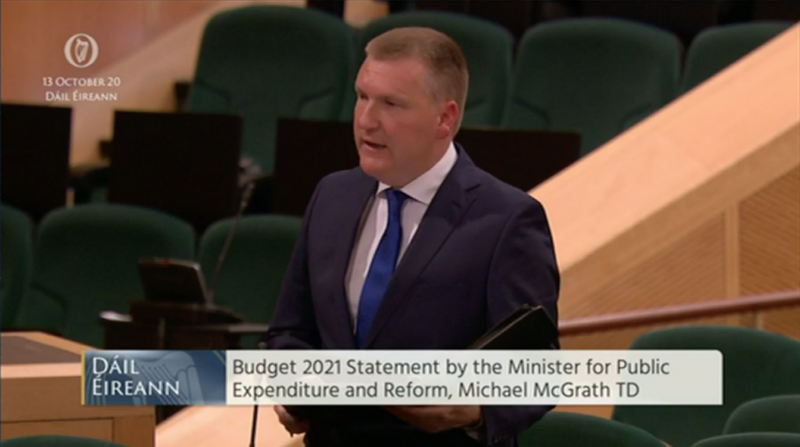Some €3.3 billion will be allocated to the Department of Further and Higher Education under Budget 2021 – up from €2.8 billion last year, Minister for Public Expenditure and Reform Michael McGrath announced today.
In total, higher education funding increased from €1.74 billion to €1.93 billion – an increase of nearly €190 million.
The two headlines for universities – who would have watched the budget announcement with cautious optimism and will likely now feel disappointed – will be the minister’s announcement of a once-off €50 million package to support individual students and a bump in investment in the SUSI grant.
Minister for Higher Education Simon Harris said on Twitter that the SUSI budget would be increased by €20 million “to meet additional demands conscious of the difficult #Covid19 times we are living through & the impact of the pandemic on incomes”.
The budget also includes an increase of the SUSI postgraduate payment from €2,000 to €3,500, and the income threshold to qualify for the postgraduate grant has also been changed, rising from €31,500 to €54,240.
Harris has pledged to carry out a review of the SUSI grant, saying that the government will “review eligibility & adjacency rates, part time education & other costs”.
“All stakeholders will be consulted”, he said on Twitter. “Vital this is done!”
The €50 million package will likely put around €250 in the pockets of each student. Harris said on Twitter that the department “will shortly decide how best to allocate it to students”.
The number of students is also set to increase in the coming years after Harris spent much of the summer making room for thousands of more students in the higher education sector.
The government has said that it will fund these additional places and continue to add places in the future.
McGrath also said that €270 million would be made available for up to 20 new buildings for the higher-education sector.
McGrath said he was “acutely aware of the impact that covid-19 has had on our young people”. He also said that Ireland’s “highly skilled and educated workforce” has been “pivotal” in attracting foreign direct investment to Ireland.
“We must not lose faith in ourselves or country to meet challenges”, McGrath said, adding that the government would “do everything in our power to protect the country”.
“The budget builds the foundation for economic recovery and a brighter future”, he added.
In a press statement, Harris said: “Covid-19 has brought unprecedented challenges for the economy and for people across the country. My Department will help people who have lost their job get back on their feet.”
He continued: “Budget 2021 will see a total investment of €118.5 million to upskill and reskill people who have been affected by the impacts of the current pandemic and train in the skills of the future, particularly the climate agenda. The investment will be aimed at those that require it the most, whether that is to assist with seeking employment or to upskill in their current jobs.”
“We will also carry out a review of student supports in line with the Programme for Government commitment but as a first step, will reform post graduate supports”, Harris added.
In his budget speech, Minister for Finance Paschal Donohoe said that the budget came in “an era of great uncertainty and increasing risk”, and was based on the assumption of a no-deal Brexit as well as the absence of a broadly available coronavirus vaccine.
“This is not the time for optimism unfettered by the challenge we confront”, Donohoe said. “But it is a time for hope.”
Higher education’s biggest stakeholders announced optimistic pre-budget submissions in the lead up to today, spurred on by the creation of the new Department of Higher Education this summer.
The Irish Universities’ Association (IUA) called for a €538 million investment in higher education in its pre-budget submission. Meanwhile, the Technological Higher Education Association (THEA) had requested €138.5 million for technological institutions across the country.
The Union of Students in Ireland (USI), called once again for the introduction of a publicly funded higher education system, starting with a €500 reduction in the student contribution fee. A reduction of the student contribution was not included in this budget.







